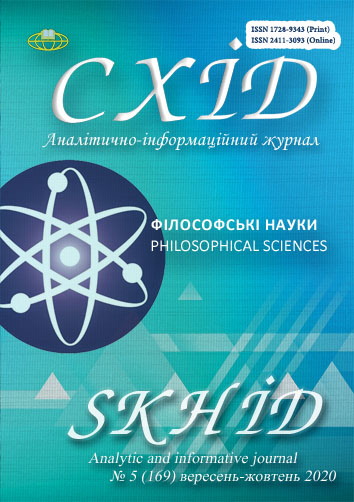THE PHENOMENON OF HISTORICAL MEMORY IN THE CONTEXT OF THE GENESIS OF HISTORICAL METHODOLOGY
DOI:
https://doi.org/10.21847/1728-9343.2020.5(169).215014Keywords:
history, memory, methodology, historiography, historical memory, politics of memoryAbstract
The article analyzes the phenomenon of historical memory and approaches to its study in contemporary scientific discourse. It is stated that its emergence is associated with methodo-logical transformations in the historical science of the last two centuries. Initially, in the course of theoretical research, historical memory was understood as a way of reconstructing the past, when an ethnos or a separate social group builds an image of the past to please the present. As a result of the crisis of traditional historiography, caused by the postmodern criticism of metanarratives, a re-actualization of historical memory occurs. In practice, this occurs in the form of mass commemorations, museumification of common and individual historical heritage, and the creation of an infrastructure for memorial tourism. Historical memory reveals its capabilities to form person’s identity and life guidelines, rooted in the fundamental and universal function of human memory. An important feature of the contemporary research situation is that the rise of historical memory occurs in a crisis of the idea of objectivity and faith in the future. The current stage in the development of historical consciousness gives a new characteristic associated with the general nature of changes concerning various layers and forms of memory, as well as with the collapse of world history and structural changes in historical representations.Downloads
References
Dodonov, R. (2018). The Institutionalization of the Politics of Memory. Skhid, 1 (153): 98-102. DOI: https://doi.org/10.21¬847/1728-9343.2018.1(153).127537
Dodonova, V., Dodonov, R., Aleksandrova, O., Popovich, O., Omelchenko, Y. (2019). Strategy and Tactics of Behaviour of Subjects and Objects of Historical Trauma. Analele Universităţii din Craiova. Istorie, 36 (2): 153-164.
Dodonova, V.I. (2019). Istorychna travma: sproba definitsiyi. Kulturolohichnyy visnyk: Naukovo-teoretychnyy shchorichnyk Nyzhnoyi Naddnipryanshchyny, 39 (1): 45-51. Retrieved from https://www.kvnn.org.ua/archives/year2019/issue39/¬ar-ticle-39-06/ (In Ukrainian)
Ferretti, M. (2005). Neprimirimaya pamyat: Rossiya i voyna. Zametki na polyakh spora na zhguchuyu temu Neprikosnovennyy zapas. 2-3 (40-41). Retrieved from http://magazines.russ.ru/nz/2005/2/fere8.html (In Russian)
Gellner, E. (1991). Natsii i natsionalizm (translat. from Engl.). Moscow: Progress, 126 p. (In Russian)
Halbwachs, M. (2007). Sotsialnyye ramki pamyati (translat. from French). Moscow : Novoye izdatelsvo, 348 p. (In Russian)
Horban, O.V.; Martych, R.V. (2019). Geneza kontseptu «istorychna pamyat» v konteksti transformatsiy istorychnoyi metodolohiyi In: Skladni pytannya istorychnoyi pamʺyati u paradyhmi dialohichnosti kultur [Difficult questions of historical memory in paradigm og culture dialogue]. Bialystok: Wydawnictwo Bialoruskie towarzystwo history¬czne, Kyyiv. un-t im. B. Hrinchenka: 10-23. (In Ukrainian)
Kansteiner, W. (2002). Finding Meaning in Memory: A Methodological Critique of Collective Memory Studies. History and Theory, 41 (2): 179-197. DOI: https://doi.org/-10.1111/0018-2656.00198
Klein, K.L. (2000). On the Emergence of Memory in Historical Discourse. Representations, 69: 127-150. DOI: https://doi.¬org/10.2307/2902903
Koposov, N. (2011). Pamyat strogogo rezhima. Moscow : Novoye literaturnoye obozreniye, 320 p. (In Russian)
Laslett, P. (2005). The World We Have Lost. London: Routledge, DOI: https://doi.org/10.4324/9780203563335
Lowenthal, D. (2015). The Past Is a Foreign Country (Revisited). Cambridge: Cambridge University Press. DOI:10.1017/CBO¬9781139024884.024
Nahorna, L. P. (2008). Rehionalna identychnist: ukrayinskyy kontekst. Kyiv : IPiEND imeni I. F. Kurasa NAN Ukrayiny, 405 p. (In Ukrainian)
Nora, P. (2005). Vsemirnoye torzhestvo pamyati. Neprikosnovennyy zapas. 2-3 (40-41). Retrieved from http://magazines.russ.ru/nz/2005/2/nora22.html (In Russian)
Nora, P., Osuf, M., Puimège, J. de & Vinok, M. (1999). Mezhdu pamyatyu i istoriyey (transl. from French). In: Frantsiya–pamyat [France-memory]. St. Petersburg : St. Petersburg State University. (In Russian)
Plumb, J.H. (1969). The Death of the Past. London: Palgrave Macmillan. DOI: https://doi.org/10.1007/978-1-349-00418-8
Samuel, R. (1994). Theatres of Memory, vol. 1. Past and Present in Contemporary Culture. New York: Verso. 1994.
Yakovenko, N. (2002). Odna Klio, dvi istoriyi. Krytyka. 12: 12-14. (In Ukrainian)
Downloads
Published
How to Cite
Issue
Section
License
Copyright (c) 2020 Olexandr Horban, Ruslana Martych

This work is licensed under a Creative Commons Attribution-NonCommercial-NoDerivatives 4.0 International License.
1. Authors bear responsibility for the accuracy of facts, quotations, numbers and names used.
2. Manuscripts are not sent back.
3. The publisher does not always agree with the authors' opinion.
4. The authors reserve the right to authorship of the work and pass the first publication right of this work to the journal under the terms of a Creative Commons Attribution-NonCommercial-NoDerivatives 4.0 International License. This license allows others to distribute (copy) the published work for non-commercial purposes, provided there is mandatory attribution to its authors and a link to the first publication in our journal.
5. The authors have the right to conclude separate supplement agreements that relate to non-exclusive work distribution in the form in which it has been published by the journal (for example, to upload the work to the online storage of the journal or publish it as part of a monograph), provided that the reference to the first publication of the work in this journal is included.

